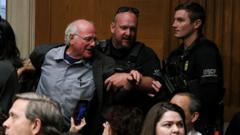Ben Cohen, co-founder of the famed ice cream brand Ben & Jerry's, made headlines when he was arrested during a protest in the U.S. Senate this Wednesday. The demonstration aimed to draw attention to military aid to Israel amidst deteriorating humanitarian conditions in Gaza and coincided with a Senate hearing where Health and Human Services Secretary Robert F. Kennedy Jr. was testifying.
Together with six other demonstrators, Mr. Cohen was charged with misdemeanours, including crowding, obstructing, and incommoding—charges often associated with acts of civil disobedience in the nation's capital. Eyewitness accounts and social media footage capture the moment he was escorted from the Senate building with his hands restrained, as he expressed outrage over U.S. policies toward Gaza, saying, "Congress kills poor kids in Gaza by buying bombs, and pays for it by kicking kids off Medicaid in the US."
The protest underscores a long history of Ben & Jerry's involvement in political and social causes since its inception in 1978, especially concerning LGBTQ+ rights and climate change. The company was acquired by Unilever in 2000, which created an independent board to uphold its founding principles. However, tensions have escalated since 2021, particularly after Ben & Jerry's decision to halt sales in the West Bank, leading to a consequential legal battle with Unilever.
In March, Ben & Jerry's filed a lawsuit alleging that Unilever terminated its CEO David Stever due to disagreements regarding the brand's political stances. As the conflict continues, a spokesperson for Unilever indicated that Cohen's actions were personal and not representative of the company or its position.
Cohen's recent arrest and the protests are furthering the ongoing discourse about the intersection of corporate ethics, political activism, and humanitarian responsibilities in an increasingly complex global landscape.




















